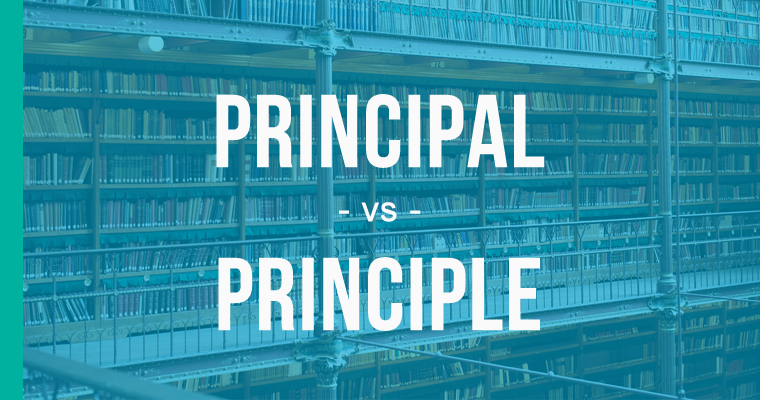Principal vs. Principle – How to Use Each Correctly

What’s the Difference Between Principal and Principle?
Contents
These two words are homophones, which means that they sound completely alike but have different meanings and spellings. Because of these different meanings, it is important to not confuse the two.
Principal can act as either an adjective or a noun. It means the most important or primary or the chief or head of an organization.
- The principal reason for the war was a dispute over territory. (adjective)
- The school principal knew the names of all her students. (noun)
Principle is a noun that means a fundamental truth or moral beliefs.
- He’s a man of good principles. He would never steal from me!
By understanding these words each in context, you can avoid the error of confusing one for the other. Now, let’s go over a few ways you can use these words in your sentences.
Using Principal in a Sentence
When to use principal: Principal can be either an adjective or a noun. As an adjective, it means foremost. As a noun, it means the person in charge.
For example:
- Teachers always sent misbehaving students to the school principal. (noun)
- There are many concerns, but the principal worry is that the company will go bankrupt. (adjective)
As a noun, this word most commonly occurs in the context of the head of a school. It is especially common for the head of a primary or secondary school.
As an adjective, this word is somewhat formal. Therefore, it is more common in academic writing than in informal conversation.
Using Principle in a Sentence
When to use principle: Principle is a noun that can either mean correct conduct or a general rule or law within a field.
For example,
- The father was very angry when he learned his three-year-old daughter had stolen from the shop. He knew she didn’t understand what she had done, but he wanted her to apologize anyway because of the principle of the matter.
- You can take this course if you want to, but you should know it is very advanced. It requires a deep understanding of the principles of mathematics and biology.
There are several idioms that use principle:
- in principle: as a general idea
- I agree with you in principle, but there are some details that will come up as we try to implement the plan that will cause problems.
- on principle: in accordance with one’s values or moral beliefs
- I’m sorry, but I cannot support fascist laws like this one on principle.
- against one’s principles: not in accordance with one’s values or moral beliefs
- As a vegetarian, eating meat goes against my principles.
- as a matter of principle: relating to one’s moral beliefs
- I’m sure your homemade beer is delicious, and I wish I could try it. However, I made a promise to my mother never to drink before I was 21 years old. Therefore, I can’t sample your beer as a matter of principle.
- to compromise one’s principles: to go against what one believes
- He hated having to compromise his principles to fit in with his peers at school. He didn’t like bullying the nerds, but he thought that he had to bully others or risk getting bullied himself.
Remembering Principal vs. Principle
There is one common method that many teachers recommend for remembering the meaning of principal based on its spelling. Principal ends with the letters pal, and the principal of your school is your pal (friend) who is there to help you.
Additionally, a principal at a school is the foremost authority. This can help you remember that principal also means most important.
All other meanings relate to the other word, principle.
Outside Examples
- For building a high-performing, integrated school in a segregated school system, Harvest Collegiate principal Burch is nominated for a Hometown Heroes in Education award. –New York Daily News
- In May, she tackled “Don Quixote’s” Kitri for the first time and made her New York debut in the title role of “Giselle” with American Ballet Theatre, where she has spent her entire career. She has been a principal dancer with the company for two years. –OC Register
- After years poking around many of the city’s most over-the-top properties, the rapper/hip-hop magnate and his superstar wife have agreed in principle to buy a modern mansion in Bel-Air for $90 million, according to real estate sources not authorized to comment publicly on the proposed deal. –LA Times
- On Sunday, Xi issued another call for loyalty as he instructed his amassed 12,000 troops to “unswervingly stick to the fundamental principle and system of the party’s absolute leadership over the army,” the official Xinhua News Agency reported. –USA Today
Quiz: Principle vs. Principal
Instructions: Fill in the blank with the correct word, either principle or principal.
- She wanted to fit in at the party by trying drugs, but it went against her __________________.
- I know that freedom of speech is important. However, the ____________ of the matter is that it is cruel to use hate speech.
- The ________________ decided to end school early after hearing of the horrible tragedy.
See answers below.
Article Summary
Should I use principal or principle? Although these words have no difference in pronunciation, they have totally different meanings.
- A principal is the person in charge of an organization, especially schools. The adjective principal means primary or most important.
- Principle refers to moral judgements or the laws that theories are built on.
Interestingly, these two words both share a root related to the meaning of first. However, their meanings can never be interchanged.
In general, use principal when speaking of school hierarchies. Use principle when referring to the laws of a scientific field or philosophy.
Answers from Quiz
- principles
- principle
- principal
